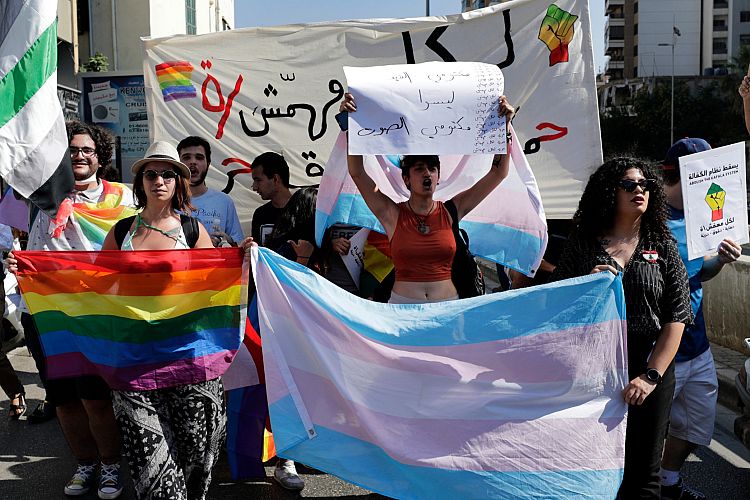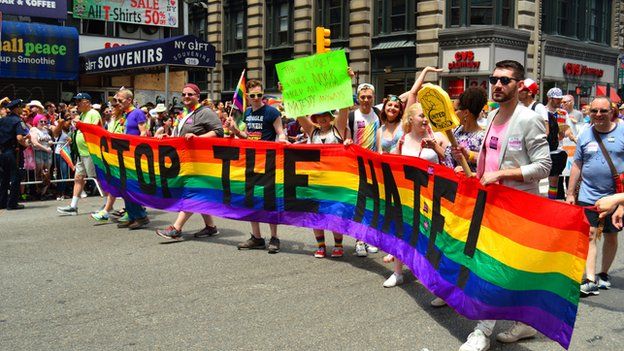- Joined
- Jan 17, 2010
- Messages
- 4,522
- Reaction score
- 5,489
By Saskia O'Donoghue & Euronews with AP
Published on 02/09/2023 - 16:19
The Middle Eastern nation is traditonally seen as fairly liberal in comparison to many of its neighbours but recent verbal, legal and physical attacks are creating a toxic environment for LGBTQ+ residents.
Lebanon is targeting iconic emblems of the LGBTQ+ community, a marked change for the country which has long shown relative tolerance in the wider region.
Drag shows, rainbow flags, films and school books are falling foul of politicians, religious leaders and vigilante groups, all stepping up a campaign against the group.
The move comes at a time when Lebanon remains in the grips of one of the world’s worst economic meltdowns in more than a century.
Political factions have been so divided that they haven’t managed to select a new president for 10 months, since Michel Aoun’s departure last October.
Nabih Berri, the parliament speaker for the country called on Thursday, 2 September, for political blocs to break the impasse and decide on a new president - and soon.
The country and its leaders have long been deeply split on how to deal with the economic and political crises.

In recent weeks, though, they have chosen to unite and fight the LGBTQ+ community.
Mirroring the culture wars in the United States, politicians and religious leaders have increasingly begun to raise alarms over trends and symbols that they believe could normalise LGBTQ+ practices, in an apparent threat to societal standards.
Lebanon has typically been seen as a place of relative tolerance in the Middle East region, traditionally fairly lenient on LGBTQ+ rights.
As crackdowns on free speech and expression have surged across the country, so has both rhetoric by politicians and harassment by individuals.
Last week, a group of men from a Christian extremist group calling itself the ‘Soldiers of God’ took it upon themselves to trash a Beirut club hosting a drag show.
Filming on their mobile phones, the throng yelled: “This is the venue of Satan!” and “Promoting homosexuality is not allowed! This is just the beginning!”, while beating up and terrifying patrons.
The situation is not much better at the top of the government, according to Lebanese media reports.
The Education Minister is said to have banned a game of Chutes and Ladders which had been distributed to schools as part of a United States Agency for International Development (USAID) project.

A long term battle: LGBTQ+ activists protest in Beirut, Lebanon, 2020
The apparent problem? It was decorated with a rainbow.
Last month, the Culture Minister Mohammed Murtada asked the General Security Directorate to ban the hugely popular movie ‘Barbie’, claiming it “promotes homosexuality and transgenders”.
The Directorate didn’t bow to that demand, however, and ‘Barbie’ will be shown in Lebanon, starting sometime this month.
The Interior Ministry, too, has yet to act on a request from the Islamic Cultural Centre, calling for the public prosecutor’s office to shut down Helem, the first LGBTQ+ rights organisation in Lebanon and the Arab World, founded in 2004.
Helem has ventured that the country’s political leaders are choosing to scapegoat the vulnerable community in order to distract from the myriad problems facing Lebanon.

In June, the Interior Ministry restricted events connected to Pride month and it’s clear that the anti-LGBTQ+ campaign is being spearheaded by political officials as well as by religious figures from Lebanon’s many Christian and Muslim sects.
Lebanon, unlike some of its neighbours, does not currently have a law that outright bans same-sex acts.
Article 534 of the country’s penal code does, however, prohibit sexual relations that “contradict the laws of nature”. That phrase has been used to penalise homosexuality on occasion, although a number of judges have long insisted that consensual same-sex relations do not fall under the law.
The Article has proven highly contentious. In July, a small group of legislators called for its abolishment, with independent lawmaker Mark Daou, accusing Shiite militant group Hezbollah of using the LGBTQ+ “to create a diversion” and to “terrorise a group within society”.
In response, the spiritual leader of Lebanon’s minority Druze community, Sheikh Sami Abou el-Mouna, led the backlash.
He claimed that eliminating the article would promote “vice and permitting what is prohibited”.
Hezbollah’s leader, Hassan Nasrallah, has voiced similar opinions.
In a recent speech, he called for the death penalty for people engaging in same-sex acts, while calling homosexuality “a clear and present danger”.
At the same time, Nasrallah accused NGOs of circulating books for school children that promote the LGBTQ+ ‘lifestyle’.
Caretaker Prime Minister Najib Mikati doesn’t appear to have been drawn too deep into the conversation as yet, but did recently tell reporters that “there is unanimity to abide by moral Lebanese and family values”.
But with senior politicians and religious figures, like Sunni cleric Khaldoun Oraymet calling homosexuality “satanic” and “a very dangerous phenomenon”, many LGBTQ+ people are choosing to lay low, even in previously liberal areas.
The new, toxic atmosphere in Lebanon comes at a time when a crackdown on the community is ramping up across the region.
Throughout the Middle East, Quran burnings in Europe have sparked angry protests, with many people choosing to burn rainbow flags in retaliation.
In Muslim-majority countries like Iraq, local religious and political leaders have chosen to paint the LGBTQ+ community as a huge part of the reason behind apparent Western attacks on Islamic values.
In Iraq, some lawmakers are continuing to push a proposal that would see a 1988 prostitution law expanded, including a paragraph that would impose life imprisonment or the death penalty on those who have same-sex relations.
https://www.euronews.com/2023/09/02...nity-under-threat-as-leaders-ramp-up-campaign
Published on 02/09/2023 - 16:19
The Middle Eastern nation is traditonally seen as fairly liberal in comparison to many of its neighbours but recent verbal, legal and physical attacks are creating a toxic environment for LGBTQ+ residents.
Lebanon is targeting iconic emblems of the LGBTQ+ community, a marked change for the country which has long shown relative tolerance in the wider region.
Drag shows, rainbow flags, films and school books are falling foul of politicians, religious leaders and vigilante groups, all stepping up a campaign against the group.
The move comes at a time when Lebanon remains in the grips of one of the world’s worst economic meltdowns in more than a century.
Political factions have been so divided that they haven’t managed to select a new president for 10 months, since Michel Aoun’s departure last October.
Nabih Berri, the parliament speaker for the country called on Thursday, 2 September, for political blocs to break the impasse and decide on a new president - and soon.
The country and its leaders have long been deeply split on how to deal with the economic and political crises.

In recent weeks, though, they have chosen to unite and fight the LGBTQ+ community.
Mirroring the culture wars in the United States, politicians and religious leaders have increasingly begun to raise alarms over trends and symbols that they believe could normalise LGBTQ+ practices, in an apparent threat to societal standards.
Lebanon has typically been seen as a place of relative tolerance in the Middle East region, traditionally fairly lenient on LGBTQ+ rights.
As crackdowns on free speech and expression have surged across the country, so has both rhetoric by politicians and harassment by individuals.
Last week, a group of men from a Christian extremist group calling itself the ‘Soldiers of God’ took it upon themselves to trash a Beirut club hosting a drag show.
Filming on their mobile phones, the throng yelled: “This is the venue of Satan!” and “Promoting homosexuality is not allowed! This is just the beginning!”, while beating up and terrifying patrons.
The situation is not much better at the top of the government, according to Lebanese media reports.
The Education Minister is said to have banned a game of Chutes and Ladders which had been distributed to schools as part of a United States Agency for International Development (USAID) project.

A long term battle: LGBTQ+ activists protest in Beirut, Lebanon, 2020
The apparent problem? It was decorated with a rainbow.
Last month, the Culture Minister Mohammed Murtada asked the General Security Directorate to ban the hugely popular movie ‘Barbie’, claiming it “promotes homosexuality and transgenders”.
The Directorate didn’t bow to that demand, however, and ‘Barbie’ will be shown in Lebanon, starting sometime this month.
The Interior Ministry, too, has yet to act on a request from the Islamic Cultural Centre, calling for the public prosecutor’s office to shut down Helem, the first LGBTQ+ rights organisation in Lebanon and the Arab World, founded in 2004.
Helem has ventured that the country’s political leaders are choosing to scapegoat the vulnerable community in order to distract from the myriad problems facing Lebanon.

In June, the Interior Ministry restricted events connected to Pride month and it’s clear that the anti-LGBTQ+ campaign is being spearheaded by political officials as well as by religious figures from Lebanon’s many Christian and Muslim sects.
Lebanon, unlike some of its neighbours, does not currently have a law that outright bans same-sex acts.
Article 534 of the country’s penal code does, however, prohibit sexual relations that “contradict the laws of nature”. That phrase has been used to penalise homosexuality on occasion, although a number of judges have long insisted that consensual same-sex relations do not fall under the law.
The Article has proven highly contentious. In July, a small group of legislators called for its abolishment, with independent lawmaker Mark Daou, accusing Shiite militant group Hezbollah of using the LGBTQ+ “to create a diversion” and to “terrorise a group within society”.
In response, the spiritual leader of Lebanon’s minority Druze community, Sheikh Sami Abou el-Mouna, led the backlash.
He claimed that eliminating the article would promote “vice and permitting what is prohibited”.
Hezbollah’s leader, Hassan Nasrallah, has voiced similar opinions.
In a recent speech, he called for the death penalty for people engaging in same-sex acts, while calling homosexuality “a clear and present danger”.
At the same time, Nasrallah accused NGOs of circulating books for school children that promote the LGBTQ+ ‘lifestyle’.
Caretaker Prime Minister Najib Mikati doesn’t appear to have been drawn too deep into the conversation as yet, but did recently tell reporters that “there is unanimity to abide by moral Lebanese and family values”.
But with senior politicians and religious figures, like Sunni cleric Khaldoun Oraymet calling homosexuality “satanic” and “a very dangerous phenomenon”, many LGBTQ+ people are choosing to lay low, even in previously liberal areas.
The new, toxic atmosphere in Lebanon comes at a time when a crackdown on the community is ramping up across the region.
Throughout the Middle East, Quran burnings in Europe have sparked angry protests, with many people choosing to burn rainbow flags in retaliation.
In Muslim-majority countries like Iraq, local religious and political leaders have chosen to paint the LGBTQ+ community as a huge part of the reason behind apparent Western attacks on Islamic values.
In Iraq, some lawmakers are continuing to push a proposal that would see a 1988 prostitution law expanded, including a paragraph that would impose life imprisonment or the death penalty on those who have same-sex relations.
https://www.euronews.com/2023/09/02...nity-under-threat-as-leaders-ramp-up-campaign

